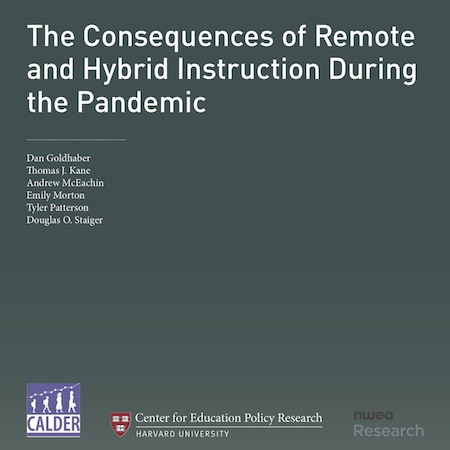 A new report finds that high-poverty schools both spent more weeks in remote instruction during the early pandemic and suffered large losses in achievement when they did so. Districts that remained largely in-person, however, lost relatively little ground. These results foreshadow a probably widening in measures of the nation’s racial and economic achievement gap.
A new report finds that high-poverty schools both spent more weeks in remote instruction during the early pandemic and suffered large losses in achievement when they did so. Districts that remained largely in-person, however, lost relatively little ground. These results foreshadow a probably widening in measures of the nation’s racial and economic achievement gap.
The report was a joint effort of the Center for Education Policy Research at Harvard University, the National Center for Analysis of Longitudinal Data in Education Research at the American Institutes for Research, and NWEA (formerly the Northwest Evaluation Association), a nonprofit research and educational services provider.
Researchers examined testing data from 2.1 million students, between third and eighth grade, in nearly 10,000 schools in 49 states and the District of Columbia. They compared achievement growth during the pandemic, from autumn 2019 through autumn 2021, to achievement growth during the two years prior to the COVID-19 pandemic. They found that high-poverty schools, which tend to have large numbers of Black students, lost a half-year of achievement growth, roughly twice as much as low-poverty schools in the same districts.
Interestingly, gaps in math achievement by race and school poverty did not widen in school districts in states such as Texas and Florida and elsewhere that remained largely in-person. Where schools remained in-person, gaps did not widen. Where schools shifted to remote learning, gaps widened sharply.
Thomas J. Kane, faculty director of the Center for Education Policy Research at Harvard University warned that “school districts urgently need to reassess their plans and ensure that the scale of their catch-up efforts matches the magnitude of their students’ losses. If they don’t, we will see the largest widening in educational inequity in a generation.”









